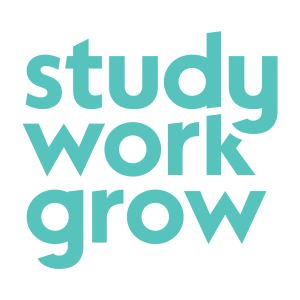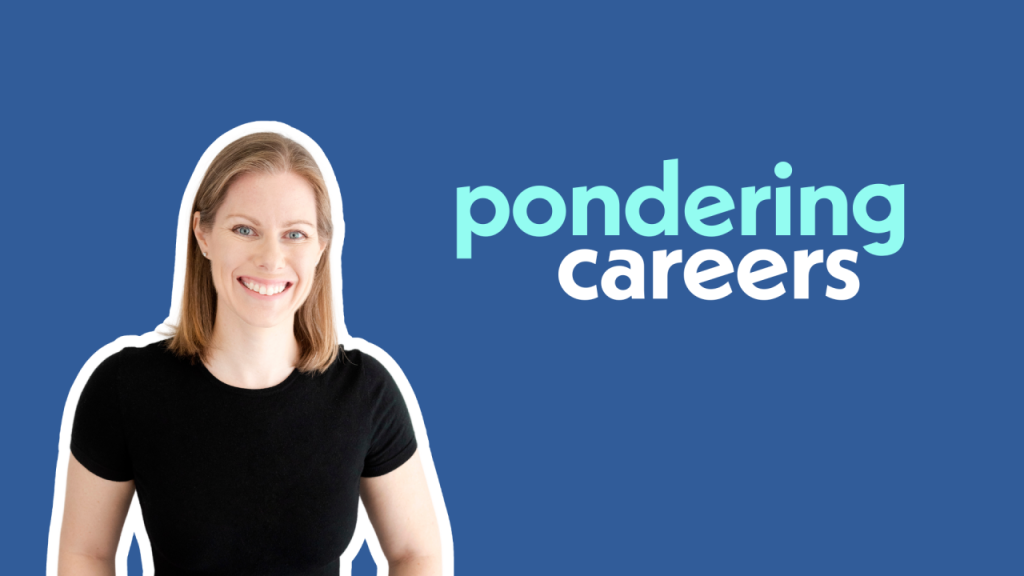We’re back with another edition of Pondering Careers, and we’re heading (some optimistic people may say barrelling) towards 2,000 subscribers, so whether you’re new here or have been following along from the first newsletter – welcome! This week, I’m going to unpack some of the insights we’ve gathered over the past week from the Subject Selection Calculator, because I think they’re well worthy of a discussion.
Wondering what the Subject Selection Calculator is? It helps young people connect the Pathways they’re considering with the subjects that could be useful for that pathway. I’ll explain more in a minute, and you can find out more here.
As part of the process, the Calculator asks students four open questions about the things they’re looking for in a career, and while these answers help us work out which Pathways to suggest to students, in aggregate they also provide us with information about how young people are thinking, which is what we’re going to look at today.
What are they looking for?
We’ve spent a long time thinking about the type of resources that will actually help young people make decisions about their senior subjects, because we want to help them clarify their thinking without giving them the answers.
It’s not an easy thing to do – if anything, it would probably be easier for us to just give them a list and tell them what to do – but in our experience students and their families often put much more stock in PDF reports and psychometric testing than they possibly should, and I think it’s more important that they have the chance to have conversations.
We first built the Subject Selection Calculator back in 2020 (I think, it was a while ago…) and since then we’ve had tens of thousands of students use it as one part of their decision making process. In the past we didn’t collect any data at all from the Calculator, but we’ve tweaked things as part of the recent refresh so we can collect anonymous data (without attaching it to individual student accounts), and so far we’ve had over 400 students use the Calculator in the past 7 days (not a bad start).
We ask four questions:
- What kinds of work environments most appeal to you?
- What working conditions are you looking for?
- How would you describe your academic performance?
- Select one or two areas of interest:
Students can choose as many options from each question as they like, but we tell them that if they select less options we can be more specific (see below).
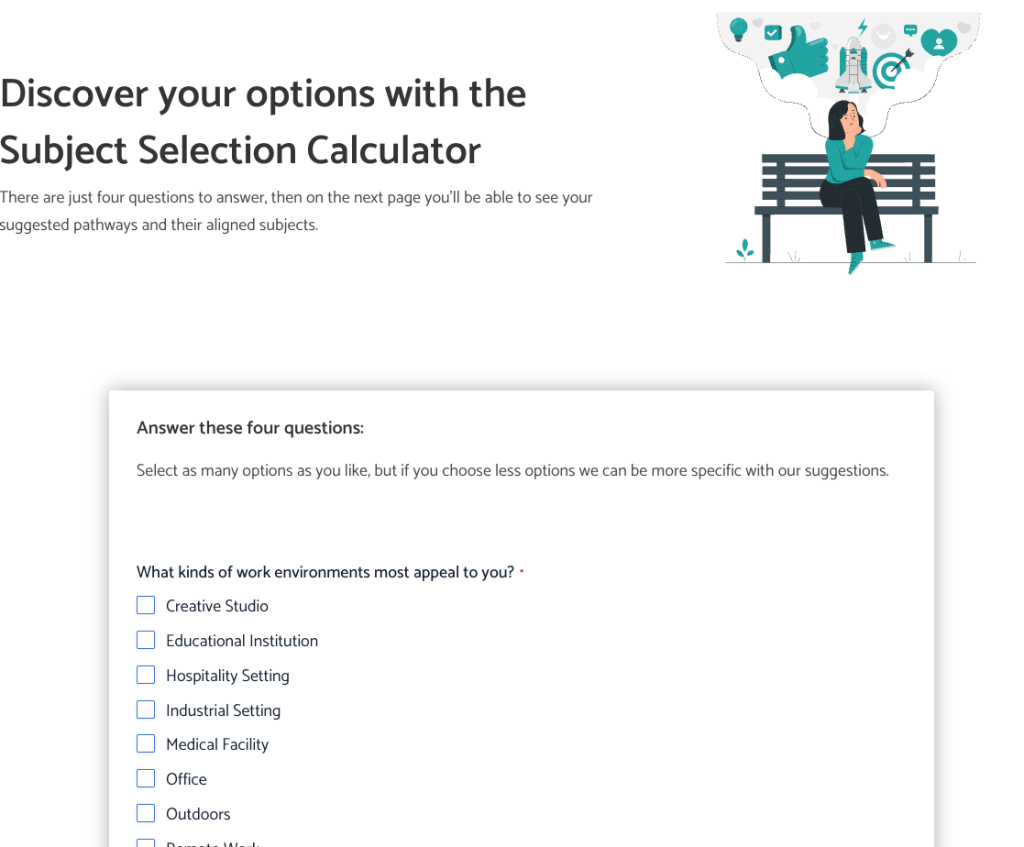
I’ll go through the data for each question in turn, followed by diving a little deeper into a couple of areas.
What kinds of work environments most appeal to you?
We ask this because it’s something that’s relatively easy for young people to identify, but we can use it to match to specific Pathways that feature those work environments.
For example, if a student said they were interested in working in an office, they would see results that included Pathways like Business, Counselling, Cyber Security, and Finance. Not all jobs in these Pathways will be office-based, but there’s a pretty good chance you could find something in an office if that’s what you wanted.
Here’s what the results show us:
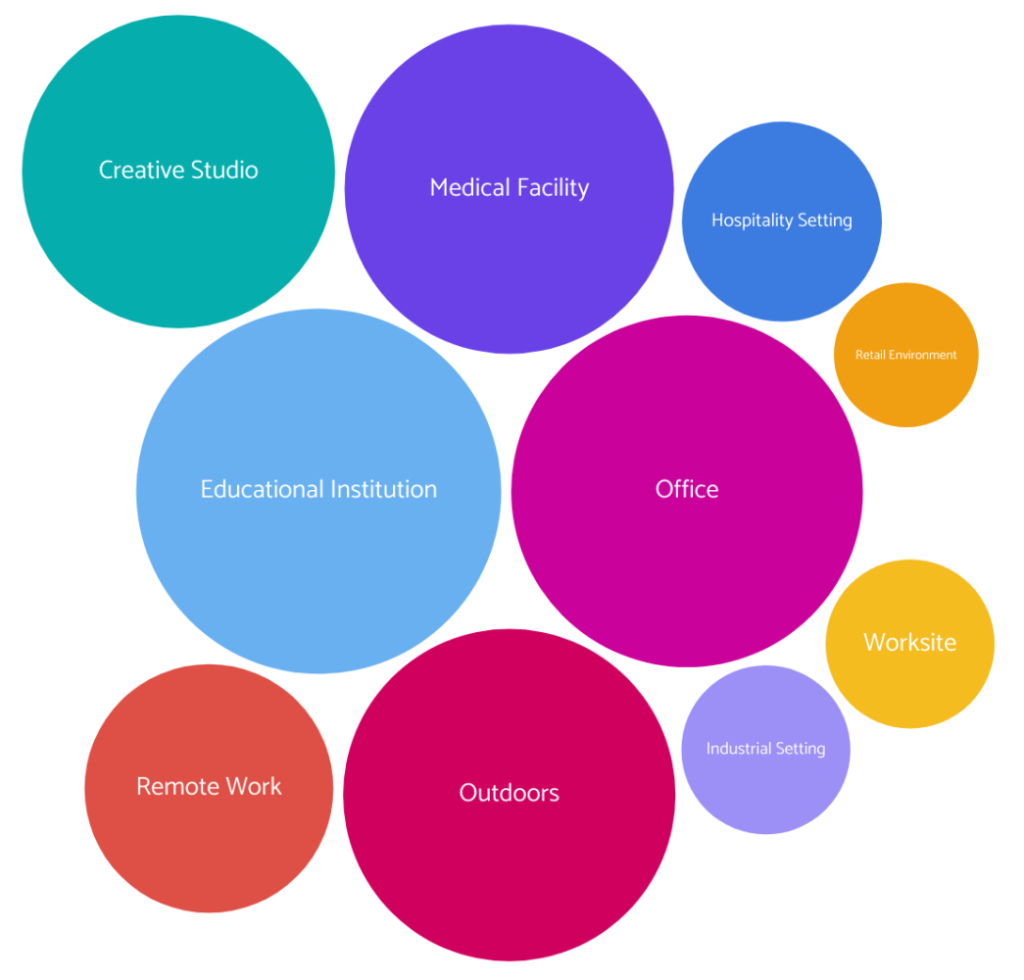
No huge surprises here – people want to work in educational settings, medical facilities, offices, outdoors, and in creative studios.
Considering how many people tell me they want to be engineers, I was surprised to see so few want to work in Industrial Settings – perhaps they have ideas about engineers working in offices?
There’s a chance that my wording needs to be reconsidered (perhaps ‘remote work’ could mean working from home OR working in remote communities?) but I think it’s interesting that these preferences don’t always align with the jobs I hear students talking about.
What working conditions are you looking for?
This question is designed to get students thinking about how their choices at this stage might influence the working conditions they access down the track. We know that some fields are notorious for not offering flexibility at work, and many Pathways have few part-time or casual options, so it’s worth considering.
That being said, we found that the vast majority of students are looking for both full-time and flexible work. 75% of students said they wanted something full-time, and almost half also want their work to be flexible.
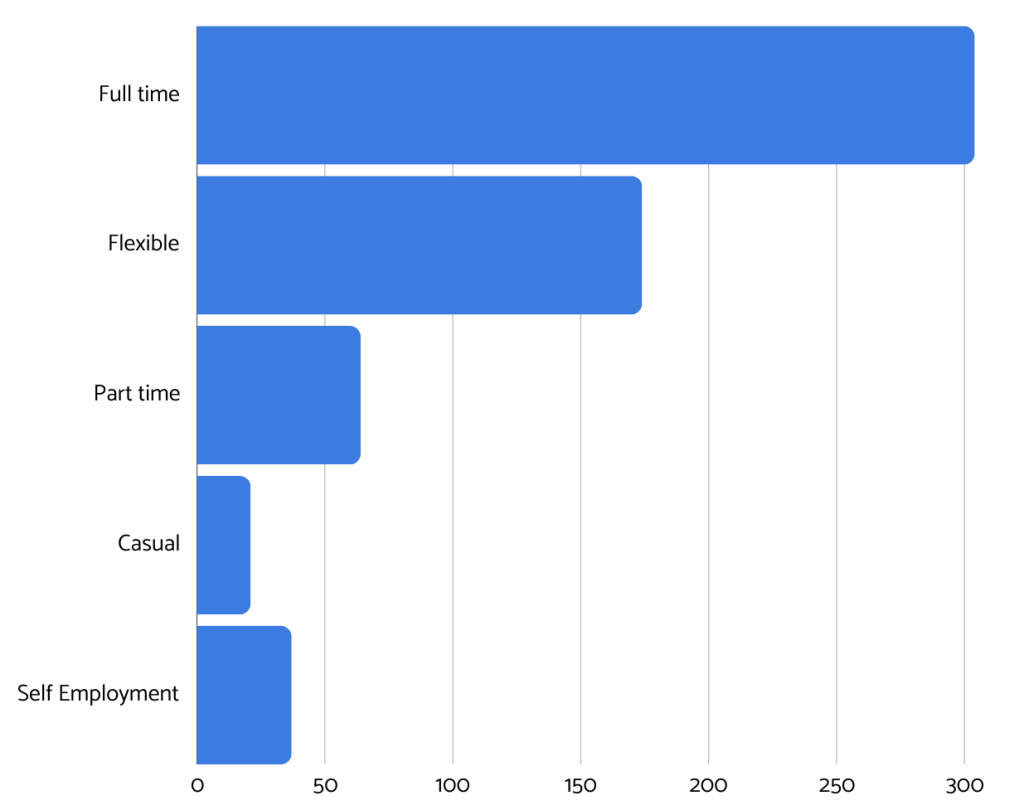
While I was not surprised about the percentages for part-time and casual work, I was surprised to see so few students thinking about self-employment. Part of this could be that they’re thinking they’d like a job to kickstart their career, and so they’re not thinking about going straight into self-employment, but I don’t think it’s the whole answer.
They are able to select as many as they like, so in choosing to not select self-employment they’re saying they’re not interested in selecting subjects that align with this.
Does this mean that only 9% of students in Year 10 are actually thinking about self-employment? I’m not sure – if you have any data on this, I’d love to see it.
How would you describe your academic performance?
I love this question – we have to ask it, because it has a bearing on some (but certainly not all) Pathways, and if we know how they’re going then we can give them more accurate answers, but it’s also fun to see how people rate themselves when they know nobody’s watching.
Rather than ask them what ATAR they expect to achieve, we ask them to rate their performance between developing, satisfactory, strong, and outstanding.
Obviously, this is going to be completely subjective. We were talking about it in the office and some of the team (who shall remain nameless) had no hesitation in saying they would have picked ‘Outstanding’ as a 15 year old, but others would have chosen ‘Strong’ so as not to overrate themselves. Here’s what the students chose:
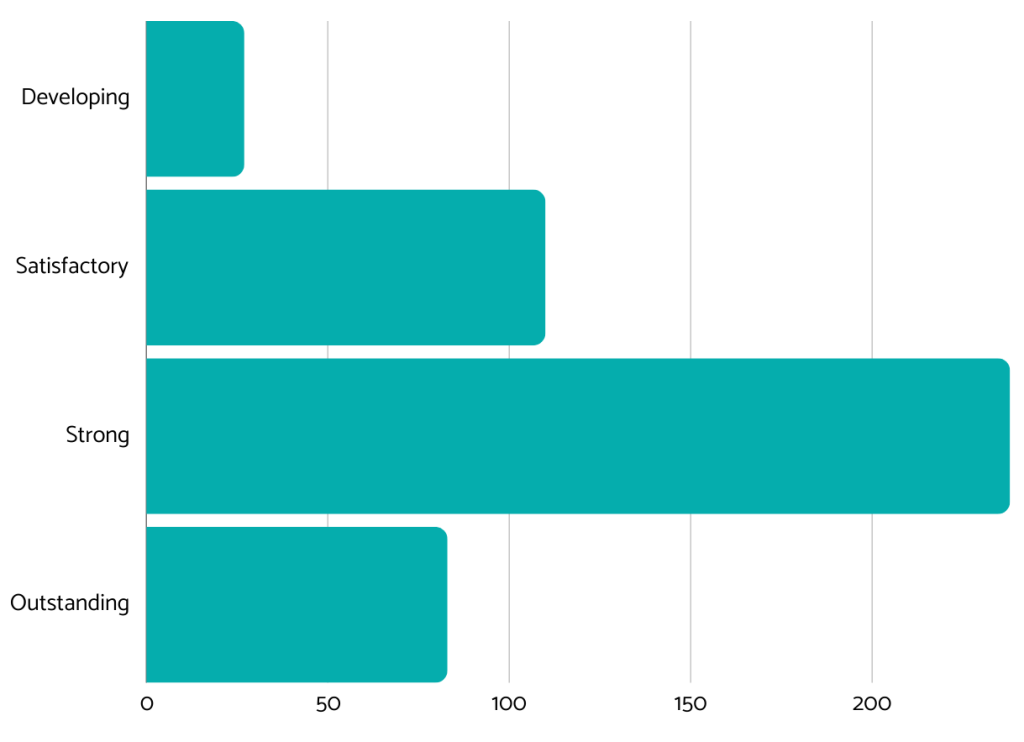
Now, I would say that this is potentially not overly reflective of their actual marks (if it is, we have some serious numbers of high performers), but I love that the majority of students think they’re doing pretty well.
Select one or two areas of interest
I feel like this is the question that’s the most open – they can choose as many options as they like from the eight interest areas, but we recommend they only pick one.
Proving my case that teenagers will follow instructions but also push things as far as they can, the average number of interests selected was 2.06, but this is good because it means they really have to think about the things that interest them most, so their Pathways are aligned with their interests.
We had a pretty even spread over the interests, and I’d say they also reflect the conversations we have with young people:
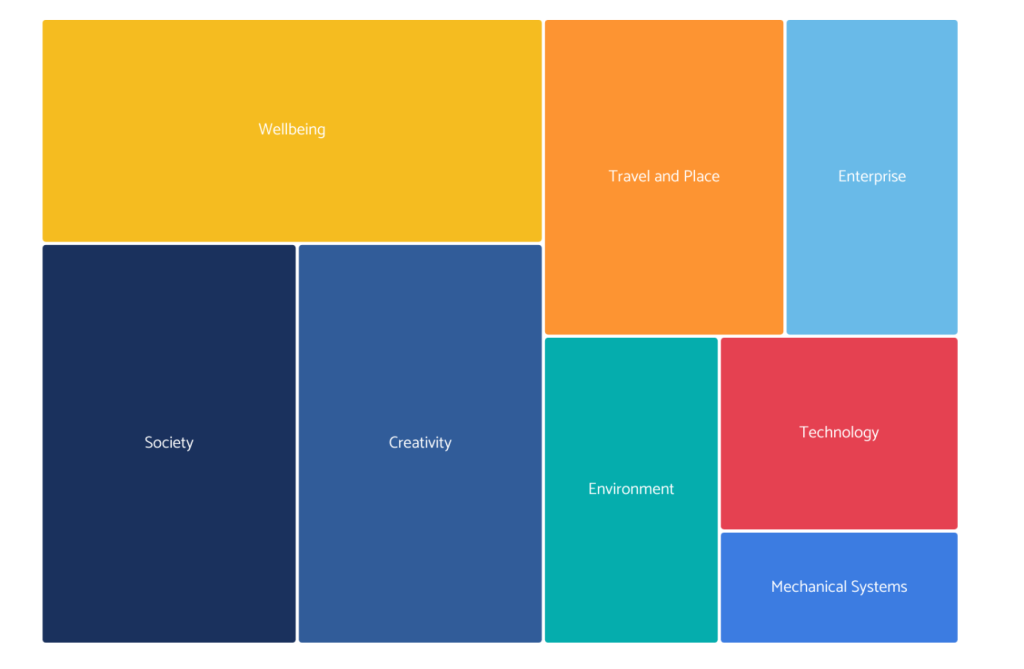
Wellbeing is the top contender with 41%, followed closely by Society (37%) and Creativity (36%), down to Mechanical Systems with just 10%.
I wasn’t surprised by the Wellbeing result – the current crop of young people are so aware of both physical and mental wellbeing, that they make me cringe when I think about how much time I spent as a teen on the couch eating Nutella with a spoon. I feel like the Wellbeing result is also echoed in the proportion of students already thinking about flexible work and working remotely.
I was more surprised at the number of students interested in Society – especially compared to other areas like Technology, or the Environment.
Other connections we can make
The data from the Subject Selection Calculator is a great place to start, but I noticed a couple of themes which I also wanted to unpack for a minute.
Creativity is popular
I totally get this one – there’s something freeing about being creative – but one thing I noticed is that an interest in Creativity doesn’t always equal a desire to work in a creative space.
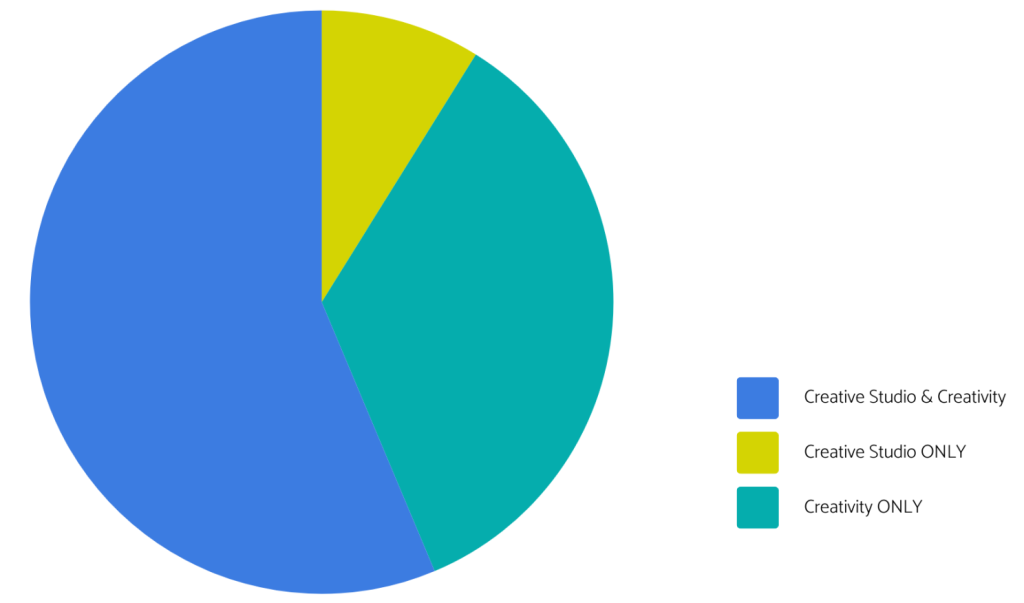
14 people said they wanted to work in a Creative Space but weren’t interested in Creativity (not sure why they would want to work there if not creative…) and 55 students who identified as Creative didn’t want to work in a Creative Space.
This trend gets worse as the student’s results improve – Creatively minded students who stated their academic progress as ‘Outstanding’ were even less likely to align themselves with working in a Creative Studio.
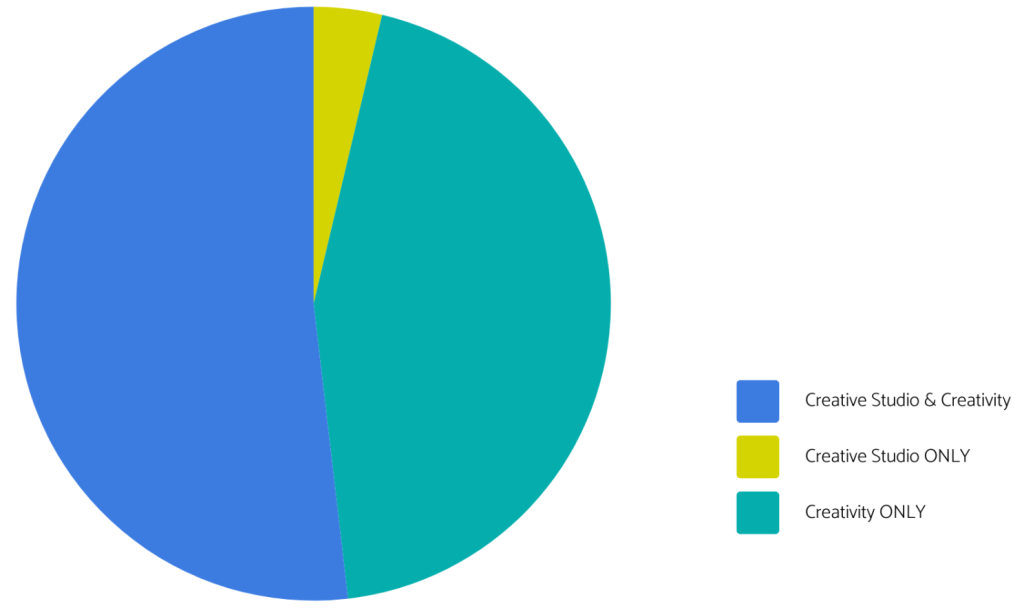
I’d be making a whole lot of speculation if I dig much deeper into this and the reasons why, but I do wonder if it has something to do with high achievers wanting to find ‘serious’ work.
I’ve had many conversations with talented young people who were creative (music, dance, art, etc.) but who fully expected to put that to one side and keep it as a hobby so they could get a ‘real’ job, ridiculous as that may be, and while I haven’t interviewed these students and have no data on their rationing I would guess this may be one reason.
The difference between Developing and Outstanding
I also noticed a trend that students who rated themselves a ‘Developing’ selected workplaces that are more aligned with trades (Outdoors, Worksite), and the opposite happened for ‘Outstanding’ students who chose Office, Medical Facility, or Educational Institution.
There’s a pretty good chance that this is a case of students self-selecting workplaces on how they feel they are performing, which goes back to the question of how vocational identity develops.
I don’t think we can just attribute this to a case of people choosing the workplace where they are most likely to end up, as the Developing students had average rates of interest in working in retail or hospitality, despite the increased number of entry level jobs in these fields – 10% of all students selected hospitality, compared to 11% of Developing students, for example.
In contrast, almost half of all Developing students said they want to work Outdoors (44%), far outweighing the 29% average for all students.
The reality is that there are jobs for all types of people in all types of workplaces, and this could indicate the outcome of the limitations we build for ourselves about what could be possible based on our performance.
Where to next?
This iteration of the Subject Selection Calculator is just starting it’s life, and I’m excited to revisit the data in the future when there’s a bit more to go on, but for now, I’m just pleased it’s up and working!
If you’re interested in the Calculator and our other Subject Selection resources you can read more here, or just let me know and I’ll walk you through it. You can also catch up on a recent webinar here which goes into a bit more detail about the what/where/why.
If you’ve got something that works for you when it comes to making subject selection easier please please please share it, because, after having gone through it myself as a parent, I appreciate anything that can help make those difficult conversations a little bit easier!
You can read previous editions of Pondering Careers here.
